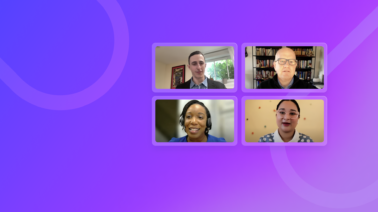In recognition of Mother’s Day this coming Sunday, this week we’re featuring three women at Udacity and their experiences as mothers working in tech. At a time in which the news media can’t stop asking whether women can have it all, we’re excited to bring you the stories of three women in tech who balance their families and careers on a daily basis.
 The first to share her experience is Liz Keleher, a project manager at Udacity.
The first to share her experience is Liz Keleher, a project manager at Udacity.
Tell me about yourself. Where are you from? What do you do? How many kids do you have?
I grew up in Fairbanks, Alaska. Now, I live in Burlingame, CA where I’m a project manager at Udacity responsible for the success of the Data Analyst and Intro to Programming Nanodegree programs. I have one daughter, Mya, who is 2.
How did you get started in tech?
I graduated from the University of Alaska Anchorage in 2001 and got my first teaching job in Cupertino, CA. I had student taught at a brand new school in Anchorage in 2001 and they had quite a bit of technology for the time. When I got to my first grade classroom in Cupertino, I was shocked to find I had no computer of my own and there were two Apple IIe computers collecting dust in the corner. These things still used floppy disks… Needless to say, I was disappointed.
I don’t feel guilty because I work. I think I’m a better mother because I am happy with my life.
I had seen the effect of integrating technology on my students in Alaska and was passionate about growing that at my new school, so I joined the technology committee. We were able to eventually get teacher laptops and a computer lab with enough more recent models of computers for every student who came during a class period to have one. I moved on to teach sixth grade at a middle school that had more access to technology and eventually learned a lot from my colleagues who were using tech tools to teach better and help students learn.
One of the tools I discovered was a social network for education called Edmodo. By now I had been teaching for ten years and I wondered if I could affect more students by getting into EdTech. I applied for a job at Edmodo and began working for them in 2010.
How has your career evolved since then?
After working at Edmodo for three years, I moved to Udacity. Our mission of using a student-first culture to democratize education resonates deeply with me.
I love being a project manager and working with content developers and student services to ensure all the students in the Data Analyst and Intro to Programming Nanodegree programs are successful. I’m MOST excited about being a student in the Intro to Programming Nanodegree. (Yup, I’m the project manager and a student!)
I’ve learned basic HTML and CSS and I’m now learning Python. I’ve been applying what I’m learning to my daily workflow in things like conversations with engineers (if I better understand what they are doing, I can be more clear and realistic about what I ask for) and updating our course wiki pages using my HTML/CSS skills. Overall, I have a lot more confidence working in an environment with people who are a lot more technical than I am. It’s challenging, but it’s been invaluable. Anyone in a tech adjacent role should develop these skills.
What does an ordinary day look like for you and your family?
We own a business (my husband runs it), so we have early mornings and late nights. I get up around 5:30 am to make it to the gym (for what I call my cheaper-than-therapy me time), and then get ready. My husband gets my daughter ready and I usually drop her off at her daycare by 8 am.
He heads either to our San Francisco or Burlingame store and doesn’t get home until around 9 pm. I make the commute to Mountain View (around 40 minutes) and leave work by 4:30 pm so I can make it to pick Mya up by 5:30 pm. We swing by the store to see my husband or we participate in a group walk or run, then head home for dinner, bath, and bedtime. Mya is usually asleep by 8:30 pm, and then I do some laundry or cleaning up. Once in awhile I get back on my computer for about an hour or so.
What was it like to go back to work after having a baby?
A lot like having returned from an alien planet and learning to walk again at the same time.
No, seriously, for me, it was a little like that because of the context switching. I really committed to being completely off for my maternity leave and focusing solely on my baby and our family. I was really lucky because my company gave me three months paid maternity leave, so I didn’t have to worry about going back earlier than that.
I started to attend weekly team meetings and being looped into things at around 8 weeks so I got caught up on what was going on. It was still hard because I had been on “mommy planet” for so long. It was hard to leave my baby at daycare at first, but it was a welcome return to something I loved — my career.
I don’t feel guilty because I work. I think I’m a better mother because I am happy with my life.
How do you balance your career and your family life?
It’s hard to constantly feel like you aren’t balancing it. I’ve had periods where I feel like I’m giving 10% to each area of my life so I’m not as successful at anything as I want to be. The balance is all about constant check-ins with myself that I am doing my best.
The balance for me is going to be different than the balance for any other person (note that I didn’t say woman here). 🙂 Am I happy? Is my daughter happy? Is my husband happy? If the answer is yes, then the balance must be good. That may change on any given day, but ultimately, I try not to ever compare myself to anyone else. That’s an invitation to feel inadequate.
Specifically, I’ve figured out a lot of tools and strategies that help. I love Google Calendar, Slack, and Asana. We recently had an author, Nir Eyal, come to our office and talk about strategies to avoid letting technology eat up your time and misalign your priorities. It’s a work in progress, but I’ve started trying a number of things to address this. I make a new “to do” list every morning when I first get up, and I use my commute time to do things I can do on the phone, like making doctor’s appointments.
…letting go of the things I don’t find time or energy for makes me happier. Being happier makes me a better team member, parent, and partner.
At Udacity, it’s not hard to prioritize my family and my own health. It’s a highly productive and successful team, but I don’t feel the pressure to be online until midnight just because other people are. I’m not worried that my family responsibilities will limit my success. That is HUGE. The way an employer supports their employees to keep that work/life balance makes or breaks things, in my opinion.
Do you wish people asked working fathers that question?
I had to think about this one, because my initial thought about doing this in the first place was, “Why an article on mothers in technology? Are we implying being in technology is especially hard for women?” So, the answer to this for me is, yes, on that level, but the truth is that I think a large percentage of women who work do actually do more of the child rearing and housework than their partners.
I know that isn’t true for everyone, but if it’s true for a large number of women who are looking for reassurance that they aren’t alone and ideas on how to strike a better balance, then it is extremely helpful for other women to share their experiences and ideas.
I also think more and more fathers are doing a larger share of the “outside the office” family support, so we should definitely ask more fathers what they suggest as well.
What guides you when you’re making a decision that affects both your career and your family?
What are the short and long-term benefits and challenges? Will this be hard in the short-term, but lead to opportunities and growth for me and my family long-term? If saying yes means more hours or travel, or in essence means less time with my family or more stress for me, the payoff has to be in my own personal growth and my family’s best interest.
Has being a mother affected your career advancement or opportunities? If so, how have you addressed that?
In my previous job, I had to travel a lot. I wasn’t given the resources I needed to do everything I was asked to do, nor the recognition for what I was doing. Ultimately, being a mother helped me realize it wasn’t the place I should be anymore. I didn’t leave because of my daughter, but I now had a reason to be more balanced. It wasn’t about just me anymore.
I chose to work at Udacity in large part because I could tell they were interested in my contribution to their goals as well as my individual success. Whether I have a child or not, I didn’t feel that would change. It became immediately apparent to me that the only thing they wanted to be sure of is that I would be a strong member of the team. What time I come or leave is pretty irrelevant if I am productive and help our team meet our goals.
Where have you found support along the way?
My in-laws and other working parents (both in and out of the office). We created a Slack channel for parents at our office and it is full of pictures and advice about parenting, work life balance, etc. The biggest support I have is the ability to talk to other people who experience the same thing because knowing you aren’t alone helps immensely.
If you’ve worked in any other industries, how does tech compare for working mothers?
I hadn’t had kids yet while I was teaching, but I think working in tech would be the better situation for me. Note that I say for me — I think so much of this is unique to each person.
Working in tech has been more flexible. If you miss a day while teaching, you have to get a sub and write down, in detail, exactly what that person has to do all day long. It was actually easier not to miss work. In my current role, I don’t have strict timelines. If I have meetings and I need to move them, I do that. If I need to leave early, I can make it up later.
What’s surprised you about being a working mother?
That it’s possible. Also, that I can’t do it all. In my experience, the pressure to advance in my career quickly and to spend all my free time replicating those incredibly creative Pinterest ideas with my daughter (Who has time to make their old TV stand into a play kitchen and still buy groceries on the weekend?) was paralyzing.
I thought my goal would be to do everything. Now I know that letting go of the things I don’t find time or energy for makes me happier. Being happier makes me a better team member, parent, and partner.
What do your kids think about your career (if they’re old enough to let on!)?
She’s a little too small to know. She’s seen me on a Google Hangout once and was just excited to meet a new “friend” as she showed off her toys to the colleague I was working with.
I think she is already learning that there are many facets to people and her mother is no different. I like my career, I love her, and I think that her experiencing having a working mother is helping to cement that.
What makes it all worth it to you?
I’m happy. My daughter is happy. My husband is happy. Today, given our specific set of circumstances, we are all doing the best we can and enjoying each day. That’s pretty much all I need.
What advice would you give to mothers considering a career in tech or to those in tech considering becoming mothers?
Work for a company who wants to find and retain successful and strong team members. They will show this in the benefits and culture they provide. If you get to know them and are still worried about being a parent or how becoming a parent will affect your success or standing, move on.
I say that as someone who has been lucky not to have a break in my employment status. I know that’s not a luxury everyone has, but if you have choices, make that a priority. I would go so far to ask directly how they ensure employees with families are supported and, if they have a family themselves, how the company helps them feel supported.
Stay tuned — we’ll be posting more features on mothers in tech later this week!



